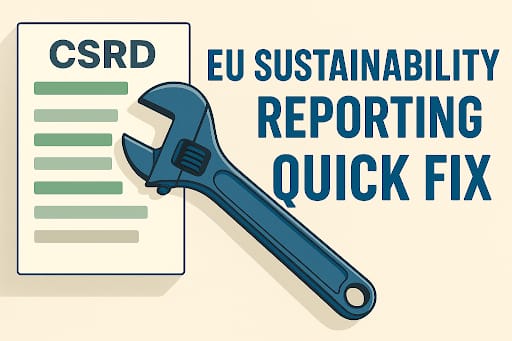- Sustainability Simplified
- Posts
- EU Sustainability Reporting ‘Quick Fix’
EU Sustainability Reporting ‘Quick Fix’


The EU Commission's ‘Quick Fix’ gives companies more time for certain disclosures.
EU Omnibus debate heats up, as pressure mounts to hold the line. New complaints raised on the rushed process.
California is the last - and largest - state with a climate reporting policy
The first British bank leaves the net zero banking alliance.
As the U.S. experiences tragic floods and megadroughts, a climate report gets buried, and states sue for disaster relief funds.
What happens when a regulator changes their mind after the regulation is issued? We are witnessing this in real-time across a variety of the “Green Deal” regulations issued in the last few years by the European Union. Confusing is an understatement. Even if you follow this closely - as many of our readers do - the twist and turns are frequent. Finding clarity in this situation is like “nailing jello to the wall” - nothing sticks.
True to our mission, we will aim to simplify the changes as the news rolls in. Our intuition is that Europe is moving rapidly now in anticipation of their traditional break in August and, suffice it to say, this will be a continuing story for some time.
The latest move from the EU is aptly titled the “Quick Fix.” The changes summarized here will allow the first group of companies subject to the EU’s Corporate Sustainability Reporting Directive (CSRD) to omit Scope 3 (value chain) climate emissions, biodiversity, and financial effects, for two years. However, companies will still be required to report summarized information on these topics if they are deemed material.
These changes affect companies that were meant to start reporting in 2025, so-called wave 1 companies. It will augment the ‘Stop the Clock’ Directive from a few weeks ago (see the pattern here?), which delayed CSRD compliance until 2028 for smaller companies (wave 2 and 3).
Meanwhile, Europe’s standards-setting body - the European Financial Reporting Advisory Group (EFRAG) - wrapped up a marathon meeting after agreeing to massive cuts to its disclosure requirements. After consultation, the simplified EU Sustainability Reporting Standards (ESRS) will be finalized by the end of the year
With the ongoing changes, it is understandable that many EU member states have yet to transpose the CSRD into national law more than a year after the transposition deadline. Just this week, Germany released a proposal to transpose the CSRD that includes the Stop the Clock Directive, delaying reporting for smaller companies by 2 years. It also temporarily delays reporting for some wave 1 companies with less than 1,000 employees.
👉 Prefer to get Sustainability Simplified straight into your inbox instead of LinkedIn? Sign up to our email list here.
2. Omnibus Negotiations Heat Up

Full plenary of the EU Parliament
With the August recess around the corner, the debate over the Omnibus simplification package in Europe is accelerating. This will set the agenda for the three-way talks between the EU Commission, Council, and Parliament (the trialogue) to finalize the Omnibus beginning in September.
Five committees of the EU Parliament met this week to agree on debating positions. Proponents say simplification is necessary to reduce businesses’ burdens, but critics argue that it goes too far and will jeopardise the delivery of the Bloc’s green deal ambitions.
While the EU’s governing bodies debate the simplification package, an influential group of companies and other stakeholders voiced support for the Corporate Sustainability Due Diligence Directive (CSDDD), stating it would "level the playing field in the internal market” and “the final compromise was widely supported by large companies, SMEs, civil society organizations, trade unions and other stakeholders across Europe.”
Adding fuel to the case for CSDDD, the EU Ombudswoman, Teresa Anjinho, pressed the Commission on why typical regulatory procedures under the EU’s “Better Regulation Guidelines” were not followed. She questioned why there was no impact assessment or public consultation before the Commission released the Omnibus.
3. California Climate Rule Stands Alone

This year, there was an expectation that an additional five states would release ‘copycat’ versions of California’s climate risk and emissions reporting regulations (SB 261 and SB 253, now jointly housed under SB 219). Now, most of those have either stalled, lost key votes, or are expected to run out of steam. Here is how each is doing:
Illinois: HB 3673 stalled in the state legislature, with no sign of any votes yet.
Colorado: Colorado’s rule was voted down, postponing it indefinitely.
Washington: SB 6092 was weakened to become a bill that directs the Washington Department of Ecology to develop policy recommendations regarding climate-related disclosures, but it has also stalled.
New Jersey: SB 4117 is also tied up in the legislative process, and with upcoming elections in the state, it is unlikely to be voted on this year.
The New York bill came close to approval, but the main sponsor of that bill, Sen. Brad Hoylman-Sigal, failed to get the bill to a vote. This week, the Senator reflected, "I don't think it was a lack of interest or effort, it was mostly due to a shorter legislative session. It's a complicated, big, important bill." He hopes someone will pick it up next year and get it passed as he moves into a new role.
For now, that just leaves California. But as the largest economy in the US and the 4th largest in the world, the California policy is precedent-setting, especially when it comes to environmental policy.
The California Air Resources Board’s (CARB) recent progress on the rules is winning over some former critics. As we reported last week, California released an FAQ following up on their Live Workshop. The main new updates from the FAQs are:
CARB is committed to finalizing rulemaking by the end of the year.
CARB will likely define “doing business in California” in the same manner as it does in the tax code.
CARB will define the reporting and assurance deadlines for Scope 1, 2, and 3 emissions in its rulemaking process.
Climate risk reports are expected on January 1st, 2026. The CARB public docket will be open for public reporting from December 1, 2025, to July 1, 2026.
CARB will consider disclosures made “based on the best available information, including information from fiscal years 2023/2024 or 2024/2025,” as good faith disclosures for the first year of reporting to avoid penalties.
You can sign up for more CARB updates on their rulemaking process here.
4. Net Zero Banking Alliance Departures Continue

UK’s financial hub, Canary Wharf
It’s no secret that the ‘net-zero alliance’ sister groups of the Glasgow Financial Alliance for Net Zero (GFANZ) have been experiencing an exodus of high-profile members.
This week, the first UK bank left the Net Zero Banking Alliance (NZBA) when HSBC, one of the alliance's founding members, announced its departure. The news comes just after the bank pushed its climate targets out by 20 years. ShareAction’s Jeanne Martin condemned the move, saying it was “yet another troubling signal around the bank’s commitment to addressing the climate crisis”.
Since HSBC’s exit, other UK and EU banks have been unable to confirm or deny their continued involvement with the group. UBS says it is considering how the group’s new, less stringent rules align with its planning. The NZBA acknowledges that it has lost 23 large banks since the group's founding. However, they have amassed 100 other banks within that time, and other members have pledged their allegiance.

5. Floods, Mega Droughts, and Recovery Issues

Flood risks in the U.S. over the coming week. Source: AccuWeather
The Trump Administration reversed a promise to store the national climate assessment. NASA Press Secretary Bethany Stevens said: “...the government agency that oversees and used to host the report met its statutory requirements by presenting its reports to Congress. NASA has no legal obligations to host globalchange.gov’s data.”
Against the backdrop of catastrophic flooding in Texas, and severe weather in the Northeast, emergency services are struggling. A coalition of 20 states sued the Trump administration on Wednesday over its decision to shut down a multibillion-dollar grant program aimed at protecting communities from floods, hurricanes and other natural disasters. The states claim the Building Resilient Infrastructure and Communities program has saved citizens $150 billion.
More severe weather is expected over the weekend in areas ranging from the Midwest to the Gulf Coast. And out West, a new study finds the mega drought will likely last for decades more.
The views expressed on this website/weblog are mine alone and do not necessarily reflect the views of my employer.
Other Notable News:
Global Weirding
Sustainability Reporting
Sustainability regulations
Energy Transition
Sustainability Research
Notable Podcasts:
This week’s episode of Joel Makower and Solitaire Townsend’s "Two Steps Forward" podcast is for future CSOs. It features an interview with Raz Godelnik, Associate Professor at the Parsons School of Design, who states that sustainability leaders of the future will need to invest in bold, entrepreneurial approaches to increase their impact.
In this week’s episode of Outrage and Optimism, the podcast team answered questions from listeners. The questions ranged from the philosophical to the practical, covering the current political backlash and how to build cooperation around action.
Notable Jobs:
Intern, Climate Change, International Union for Conservation of Nature (IUCN), Washington D.C.
Senior Sustainability Analyst - Strategy & Operations, Bloomberg, New York, NY
Senior Director, Climate and Energy, Electric Power, Ceres, U.S., Remote
Corporate Sustainability Strategy Leader, Rebobank, Utrecht, Netherlands, Hybrid
Reply